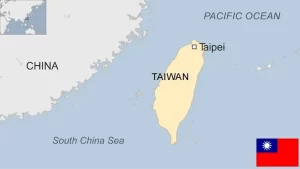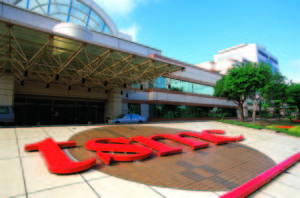“The bottom line here is that U.S. hopes of using a re-invigorated Taiwan defense structure to help anchor a coalition of China-wary nations in the western Pacific have now gone down in flames …Our assessment is that a Trump victory in … the upcoming election in the United States would act as a clear incentive towards the Chinese to move with added energy against Taiwan.”—Peter Enav, Taiwan Strait Risk Report
BY STAS MARGARONIS
China may be making its long-anticipated move to bring Taiwan under Chinese rule without resorting to an invasion or armed attack, according to Peter Enav the founder and editor of the Taiwan Strait Risk Report.
The loss of democracy and independence for Taiwan would mean the loss of freedom for 24 million Taiwanese.
Enav spoke at the Los Angeles Customs Brokers and Freight Forwarders Association (LACBFFA) webinar on July 31st, 2024 where he said: “Is there another way of bringing Taiwan under Chinese control without risking the economic dislocation and the possible military difficulties involved in a blockade slash invasion of Taiwan? And in fact there is. This is the route they are traversing now and have been traversing for at least two or three years. We call this route the ‘gray zone’ short of war option. It is really about … ratcheting up economic and political pressure on Taiwan … that leads to a situation wherein the Taiwanese decide on their own volition to throw in the towel and bow to Chinese demands without a shot being fired.”
Enav has spent 17 years living and working in Asia, including nine (2005-2014) as the head of the Taipei bureau of the Associated Press, where he closely monitored Taiwan defense issues and the evolution of the U.S.-China-Taiwan strategic triangle. [1]
‘Gray Zone’ Warfare
On June 11th, Taiwan’s Coast Guard reprimanded 10 officers for negligence after a Chinese motorboat evaded Taiwan’s defenses and sailed into a harbor at Tamsui, New Taipei, according to a Taiwan News report.[2]
The report said that on June 9, “a Chinese man surnamed Ruan drove a motorboat into the Taiwanese harbor claiming he wished to defect to Taiwan from China. An investigation revealed Ruan was a former People’s Liberation Army Navy (PLAN) captain.“
Ocean Affairs Council (OAC) Minister Kuan Bi-ling said the Coast Guard made several missteps as Ruan’s boat approached the harbor. It was only after the motorboat collided with other vessels at a ferry terminal that operators called the Coast Guard. Officers failed to sound the alarm because they had “30 vessels to monitor at the same time,” according to Kuan. “This case shows that the problem is not with the system but the people in charge,” she said.
Defense Minister Wellington Koo added that the incursion could be part of China’s gray zone tactics and the officials would use this incident to strengthen countermeasures. Ruan has been taken into custody for further investigation.[3]
Economic Impact to the United States
The loss of Taiwanese independence would also pose a serious national security threat to the United States and its allies in East Asia by expanding China’s influence and control in the Pacific.
The loss of Taiwan would be felt in the United States by the potential denial by China of Taiwan’s advanced semiconductor products made by Taiwan Semiconductor Manufacturing Company (TSMC) and others which could have a devastating effect on the U.S. economy.
According to a 2023 report produced by the U.S. Taiwan Business Council entitled Final Report: U.S., Taiwan, and Semiconductors: A Critical Supply Chain Partnership: “The U.S. companies interviewed for this report all indicated that any significant disruption in Taiwan’s ability to participate in the global semiconductor industry would have severe negative consequences for their business. Taiwan companies expressed their real concerns about potential disruptions in power or water availability, but their biggest concern was aggressive action from China.”[4]
Pro-China Allies in Taiwan Growing Political Clout
Elsewhere Enav has noted that the parliamentary victory in January of the pro-China KMT party in Taiwan, supported by the eight-member parliamentary faction of Ko Wen-je’s Taiwan People’s Party (TPP) “ is set to superintend the torpedoing of virtually every meaningful Taiwanese military appropriations bill over at least the next four years, to say nothing of putting the kibosh on much needed military reform measures, like creating well-trained local militias within the framework of a thoroughly re-worked reserve system. The bottom line here is that U.S. hopes of using a re-invigorated Taiwan defense structure to help anchor a coalition of China-wary nations in the western Pacific have now gone down in flames.”
He added that the TPP may yet change its mind and vote with the parliamentary faction of newly elected President Lai Ching Te’s Democratic Progressive Party which supports an independent Taiwan, on defense policy, “but given the rather whimsical nature of the TPP’s leader, this is not an outcome I would predict with confidence.”
Escalations
Enav told the LACBFFA: “We’re about two or three years into this ‘gray zone’ short of war approach. And what that involves … over the past 18 months is the incremental destruction of the median line between Taiwan and China … escalating Chinese violations of what the … Taiwanese call their air defense identification zone. So that we would see a couple of years ago, typically something like 15, 20, 30, such violations on a monthly basis. The last month (June) …. I think it was something like 450. At the same time, the Chinese are moving naval assets into position off the east coast of Taiwan in a way that demonstrates their ability to bring to bear an effective blockade or quarantine of Taiwan. They haven’t done that yet but they are showing that they are able to do that. They are also working with the fifth columnists who I identified earlier (the KMT opposition party) to try to demonstrate to Taiwanese people that resistance is futile and that it is in their interest to try to reach a reasonable deal with China that would allow everybody to make some money, live in peace, albeit under Chinese control.”
U.S. 2024 Elections
A strong element supporting China’s political and psychological war to take over Taiwan is the assertion that the United States will not come to Taiwan’s aid in the event of an attack: “At the same time we see this drumbeat of … propaganda from people who are sympathetic to China within the Taiwanese political elite, to the effect that: ‘we really have to come to an arrangement with … these people. They are more numerous than we are. They are stronger than we are.’ And particularly with the unsettled situation and the political situation in the United States … we simply cannot count on the United States to back us and without American backing, we know, and everybody acknowledges that Taiwan cannot fight off the Chinese on their own.’ They need outside help. They need American help. “
Enav says a key element of proof advanced by the pro-China forces in Taiwan are statements made by Republican presidential candidate Donald Trump that he is not interested in defending Taiwan because Taiwan is not paying enough money for defense (KMT opposition party is opposed) or that Taiwan has taken semiconductor markets from the United States, even though Taiwan’s leading semiconductor manufacturer TSMC is currently building semiconductor fabrication facilities in the United States:
“Former President Trump said in the interview with Bloomberg that Taiwan should effectively pay for their own defense. Trump said that we get nothing from Taiwan. We should not be their insurance policy without getting paid for it. Trump has a lot of animus against Taiwan for what he considers to be Taiwan’s role in the destruction of the U.S. chip industry. He is also used a felt tip pen to compare the size of Taiwan … to the size of China, and saying, look, … this is a no brainer. One side is so much stronger on the other, and it behooves us to back the stronger side. We know that he is not sympathetic to the post-World War II security architecture in the Pacific, or indeed anywhere around the world. That’s why some of the NATO members are so concerned about the possibility of a second Trump presidency… Our assessment is that a Trump victory in … the upcoming election in the United States would act as a clear incentive towards the Chinese to move with added energy against Taiwan.”
Additional Factors
Other factors that could encourage China to move on Taiwan soon are:
1)The United States’ involvement in the Middle East: “A wider Middle East war is very, very threatening for the Taiwanese because it could convince Chinese leader Xi Jinping to say to himself: ‘Well, the Americans are preoccupied with the Middle East particularly in the run up to the U.S. election. They don’t want a multi-front war. They don’t even want a single front war.’ “
2) The state of the Chinese economy: “The Chinese economy is encountering very, very substantial difficulties. There is a concept that we think about called ‘Peak China.’ And basically it … asks the question: ‘Has China reached or passed its apogee of its ability to project economic, political, and military power?’ A lot of people are arguing that ‘Peak China’ is passed. If this is the case … then this might act as an incentive for the Chinese to move aggressively against Taiwan.”
3) The worsening relations between Xi Jinping and China’s People’s Liberation Army could cause a backlash by the armed forces: “Over the past year, there have been any number of purges in the … Chinese army, carried out by Xi Jinping. And basically, the purges have been about corruption in the Chinese military … And Xi Jinping has basically been saying at least since 2015, 2016, (that) a continuation of these trend lines is unacceptable, and ‘I have to do something about it.’ Well, what does this mean on the ground for Taiwan? It means that Xi Jinping may not be in a position now where he trusts his military leaders to carry out a successful move against Taiwan in a way that he might have been several years ago.”
FOOTNOTES
[1] https://taiwanrisk.com/
[2] https://www.taiwannews.com.tw/news/5888270
[3] Ibid.
[4] https://www.us-taiwan.org/resources/us-taiwan-and-semiconductors-a-critical-supply-chain-partnership/
and https://www.usitc.gov/publications/332/working_papers/us_exposure_to_the_taiwanese_semiconductor_industry_11-21-2023_508.pdf


